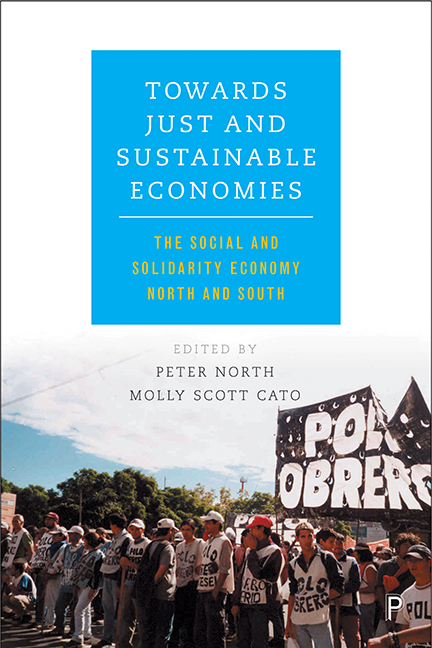Book contents
- Frontmatter
- Dedication
- Contents
- List of figures and tables
- Notes on contributors
- Acknowledgements
- One Introduction: new economies North and South – sharing the transition to a just and sustainable future
- Part I Theoretical perspectives on the social and solidarity economy
- Part II The social and solidarity economy as a site of social innovation
- Part III The social and solidarity economy and the state
- Part IV Policy translation between North and South
- Index
Fourteen - Living sín patrón: lessons from Argentina’s societies in movement
Published online by Cambridge University Press: 05 April 2022
- Frontmatter
- Dedication
- Contents
- List of figures and tables
- Notes on contributors
- Acknowledgements
- One Introduction: new economies North and South – sharing the transition to a just and sustainable future
- Part I Theoretical perspectives on the social and solidarity economy
- Part II The social and solidarity economy as a site of social innovation
- Part III The social and solidarity economy and the state
- Part IV Policy translation between North and South
- Index
Summary
The workplaces recuperated by their workers in the last years have created more jobs with new forms of production grounded in relationships of compañerismo. They have demonstrated that the problem of the economy was not labour cost, but boss cost [costo patronal]. Zanon, Brukman, Gatic, Durax, are examples of these experiences that today have begun to inspire workers in other countries in crisis. Their stories, histories and dreams, while contagious, also carry a quantity of self-organised projects, and help others discover the possibility of living sín patrón [without a boss] deciding their own destinies. (Lavaca Collective)
Introduction
This chapter explores some of the movements that arose in Argentina soon before and after the popular rebellion of 19 and 20 December 2001 – movements whose forms of organising, such as horizontaldad, prefigurative politics and autogestión, closely coincide with movements that have emerged over the past 20 years across vast geographic areas. It then explores what sorts of lessons communities and societies in movements such as Occupy, the ‘movements of the squares’ and the climate justice movement can learn from the Argentine experiences – using the framework of working and living Sín patrón to help guide the discussion.
In recent decades, people have been finding ways to resist various crises (economic, political, social and environmental) by organising together. Examples include: the Zapatistas declaring a resounding ‘Ya basta!’ (’Enough is enough!’) in 1994 in the face of institutional power and creating dozens of self-governing communities; the 2001 popular rebellion in Argentina, where people sang ‘Que se vayan todos, que no quede ni uno solo!’ (‘Everyone must go, not even one should remain!’) in the streets, and which led to the citizens creating alternative horizontal, non-hierarchical assemblies, recuperating workplaces, establishing popular media outlets and building autonomous communities on the periphery of cities; the hundreds of thousands of people around the globe organised in neighbourhoods and entire communities, often led by women, to defend land, water and air using forms of direct democracy and direct action; and the Occupy movement and the movements of the squares, mobilising millions around the world and looking to one another instead of the institutions that created the crisis.
This type of organising, without hierarchies and in the spirit of resistance, is creating something new, focusing on social relationships and prefiguring participants’ desired ends.
- Type
- Chapter
- Information
- Towards Just and Sustainable EconomiesThe Social and Solidarity Economy North and South, pp. 257 - 274Publisher: Bristol University PressPrint publication year: 2017



